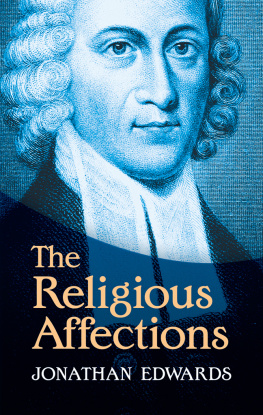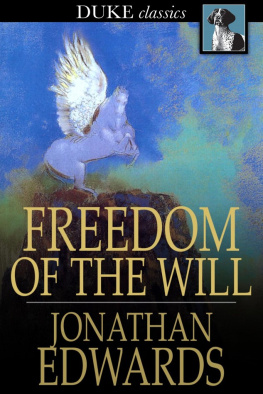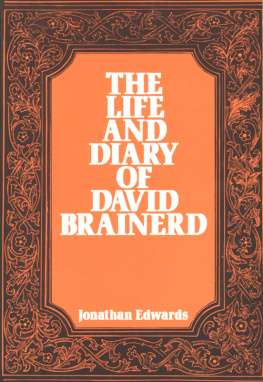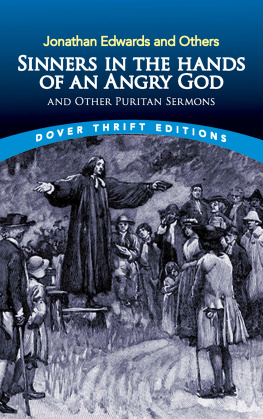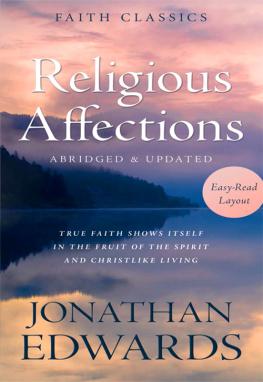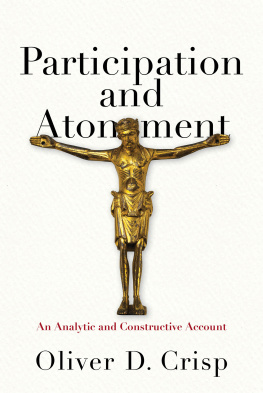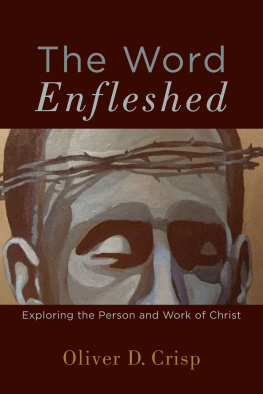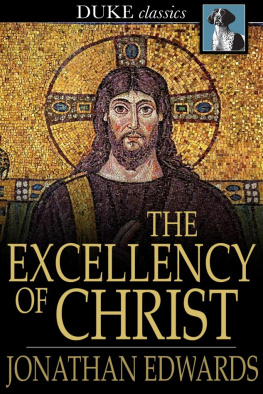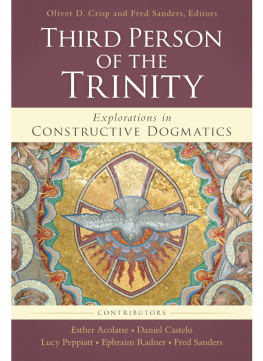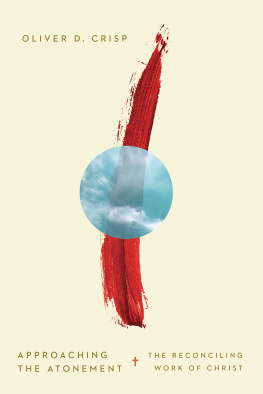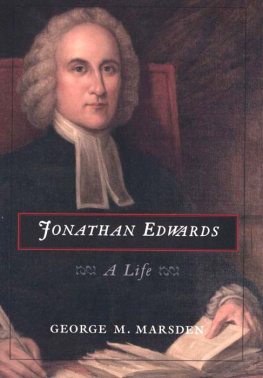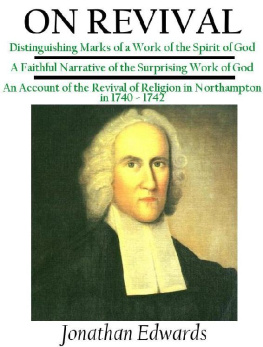JONATHAN EDWARDS
It has often been claimed that Jonathan Edwards (170358) was Americas greatest philosopher and theologian. From literary criticism of his sermons to philosophical assessments of his metaphysics, there has been a burgeoning industry in Edwardsian studies, but there has been no one place where an exploration of the theology and philosophy of Edwards has been brought together.
2003 marks the tercentenary date of the birth of Jonathan Edwards. This book draws together specially commissioned contributions from distinguished philosophers and theologians from the USA and UK, to present new analytic philosophical and theological thinking on Edwards in a way that reflects Edwardss own concerns as well as those current in the academy.
For Angela and Claire
Jonathan Edwards
Philosophical Theologian
Edited by
PAUL HELM
University of London, UK
OLIVER D. CRISP
University of St Andrews, UK
First published 2003 by Ashgate Publishing
Reissued 2018 by Routledge
2 Park Square, Milton Park, Abingdon, Oxon OX14 4RN
711 Third Avenue, New York, NY 10017, USA
Routledge is an imprint of the Taylor & Francis Group, an informa business
Copyright Paul Helm and Oliver D. Crisp 2003
The editors have asserted their moral right under the Copyright, Designs and Patents Act, 1988, to be identified as the editors of this work.
All rights reserved. No part of this book may be reprinted or reproduced or utilised in any form or by any electronic, mechanical, or other means, now known or hereafter invented, including photocopying and recording, or in any information storage or retrieval system, without permission in writing from the publishers.
Notice:
Product or corporate names may be trademarks or registered trademarks, and are used only for identification and explanation without intent to infringe.
Publishers Note
The publisher has gone to great lengths to ensure the quality of this reprint but points out that some imperfections in the original copies may be apparent.
Disclaimer
The publisher has made every effort to trace copyright holders and welcomes correspondence from those they have been unable to contact.
Typeset in Times Roman by Bournemouth Colour Press, Parkstone, Dorset.
A Library of Congress record exists under LC control number: 2002042676
ISBN 13: 978-1-138-71135-8 (hbk)
ISBN 13: 978-1-315-19985-6 (ebk)
Contents
Notes on the Contributors
Jonathan L. Kvanvig
William J. Wainwright
Hugh J. McCann
Paul Helm
Oliver D. Crisp
Philip L. Quinn
Stephen R. Holmes
Amy Plantinga Pauw
Gerald R. McDermott
Michael J. McClymond
Oliver D. Crisp is a Teaching Fellow in Theology at St Marys College, University of St Andrews, UK.
Paul Helm is Professor Emeritus of the History and Philosophy of Religion, Kings College, University of London, UK.
Stephen R. Holmes is Lecturer in Christian Doctrine, Kings College, University of London, UK.
Jonathan L. Kvanvig is Professor of Philosophy, University of Missouri, Missouri, USA.
Hugh J. McCann is Professor of Philosophy, Texas A&M University, Texas, USA.
Michael J. McClymond is Assistant Professor of Theology, St Louis University, St Louis, USA.
Gerald R. McDermott is Associate Professor of Religion, Roanoke College, Virginia, USA.
Amy Plantinga Pauw is Henry P. Mobley, Jr Professor of Doctrinal Theology, Louisville Presbyterian Seminary, Kentucky, USA.
Philip L. Quinn is John A. OBrien Professor of Philosophy, University of Notre Dame, Indiana, USA.
William J. Wainwright is Distinguished Professor of Philosophy, University of Wisconsin, Milwaukee, USA.
It has often been claimed that Jonathan Edwards (170358) was Americas greatest philosopher and theologian. Whether this is true or not, he was certainly a thinker of the first rank whose work continues to generate interest today. From literary criticism of his sermons to philosophical assessments of his metaphysics, there has been a burgeoning industry in Edwardsian studies since Perry Millers seminal work, over half a century ago.1 The two disciplines most central to Edwardss thought, theology and philosophy, have been well represented in this Edwardsian renaissance. In recent years there have been several book-length treatments of Edwardss thought, from a range of theologians, some of whom are represented in the present work.2 A welcome development in the same period has been a greater interest shown in Edwards (at least a greater published interest), from analytic philosophers.3 But there has not been one volume where central theological and philosophical concerns in Edwardss thought have been brought together in a way that reflects the confluence of scholars working in both these traditions. This volume is just such a contribution.
The Rehabilitation of Jonathan Edwards
Edwards lived at the beginning of the Enlightenment, a time of great intellectual ferment and political upheaval. And he was a man of his times in more than one respect. In his lifetime he was successively a college tutor, a Congregationalist minister, a revival preacher, a missionary and the President of Princeton. He wrote on natural philosophy (natural science), philosophy, theology and apologetics, and left a considerable body of sermons. But he was not engaged in simply passing on a tradition. He was concerned to demonstrate the reasonableness and veracity of the Christian faith and of Reformed theology to his early Enlightenment contemporaries. To this end, he was not afraid to use all the intellectual tools he could find, since he believed that all truth is Gods truth.
It is this concatenation of different interests and the way in which he sought to recast traditional theological problems that has given rise to a number of misrepresentations of Edwardss intellectual project. There has been an enduring, popular picture of the evangelical Edwards, which is sometimes in danger of reducing the canon of Edwardss works to the Religious Affections, David Brainerds Diary and some popular sermons. Then there have been those who took up Edwardss mantle in the late eighteenth and nineteenth centuries, but gradually moved away from his own thinking, in the development of the so-called New England and, latterly, New Haven schools of theology. As the seriousness of Edwardss Calvinism and severity and rigour of his approach to theological issues fell out of favour during this period, Edwards was seen by many as a figure of tragedy, one whose early philosophical and scientific promise was thwarted by his conversion and adherence to an antique and distasteful theological tradition. It was because his philosophy was thought to be harnessed to what was regarded as an unpalatable theological programme that during this period (and, indeed, until relatively recently) his philosophy was not taken as seriously as it might have been. But theologically, too, Edwards was out of fashion. By the early twentieth century German theology had swept away the theological conservatism that Edwards had staked his reputation on. His high view of Scripture, and the implications this had for every theological




